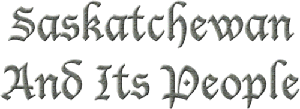PERSONAL KNOWLEDGE OF THE EARLY EUROPEAN IMMIGRANT.
THE EAST LONDON SETTLEMENT.
uries for immediate consumption, after the manner of the improvident
everywhere. In some cases additional loans were advanced at a rate of
two per cent, less than any other settlers in the Territory could obtain
them. At its own expense the Company had sent a practical man among
the Londoners when they came out, to teach them the rudiments of farm-
ing, show them how to build their houses and how to manage an ox. One
man who could not make this animal understand what was required of it,
was discovered disciplining it by tying it to a tree and soundly belabor-
ing it.
There were all types among the lot, honest and dishonest, patient and
unreasonable, hardworking and lazy; prosperous and unprosperous. Most
of them had fifty acres under cultivation now, and some had made repay-
ment already of special loans though the main debt was unpaid in every
case so far. The most profitless human investment the Baroness and the
Company have made we come to first; at the agent's approach it turns
and shuffles indifferently out of earshot. The man, we are told, is utterly
and helplessly lazy. Of his hundred and twenty acres, two or three are
scratched into ragged cultivation; he has no stock, his neatly planned
little home is squalidly unfinished. He began with the rest and under
the same conditions, but beyond the requirements of his appetite he will
not work. But this is the worst and the worst of a great deal. The next
place is that of the "parson," who came out in charge of the rest, really
only a lay reader, but a person of a certain superiority. He has left "par-
soning," says our informant, and taken to crops and cattle, and he is In-
dependent now. His ricks are mellow in the sun, his oxen switch their
tails reposefully, his long haired dog barks at us as we drive past In a way
that shows easy mastery of democratic principles. But we do not alight
till we get to "John's." I can't tell you John's other name, lest he should
rise to the dignity of a leading member of Assiniboian Society, and sue
the paper for dealing lightly with his domestic affairs. Perhaps after all
It doesn't matter.
John looks, as he stands among his prairie assets, without the least
disrespect to that body, like a just received member of the Salvation
Army. His complexion has a large foreign element about it, his cloth~
hang loosely, leaving ample room for the development of his immediate
personal estate, his eyelids droop, he has adopted the Blackfoot idea of
hair cutting, and he radiates cunning enough to supply political sagacity
to the whole Council of Assiniboia. I have mentioned his assets. They
Include a wooden house of perhaps three rooms, in close juxtaposition
with a warm sod construction for his poultry and log stable, sheltered by
a couple of hay ricks. A good many bushels of wheat lying stacked about,
several acres in sight, two well fed oxen, plenty of hens and ducks. Item:
one dog, mongrel, snapping. Item: one wife, a degree more agreeable to
look at. Item: eight children, barefooted and squalid but rosy and con-
tent, one of whom will probably be Mayor of Moosomin some day.
"Yes, there's eight," says their proprietor, not without pride.
"An'
Bibliography follows:

